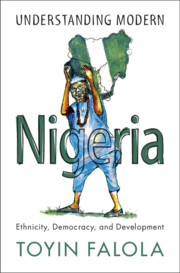4 results
15 - Women
- from Part III - Colonial Societies
-
- Book:
- Understanding Colonial Nigeria
- Published online:
- 21 November 2024
- Print publication:
- 28 November 2024, pp 321-346
-
- Chapter
- Export citation
18 - Challenges of Western Education
- from Part IV - Development Crises
-
- Book:
- Understanding Modern Nigeria
- Published online:
- 09 June 2021
- Print publication:
- 24 June 2021, pp 434-448
-
- Chapter
- Export citation

Understanding Modern Nigeria
- Ethnicity, Democracy, and Development
-
- Published online:
- 09 June 2021
- Print publication:
- 24 June 2021
Chapter 1 - A brief history of Aboriginal and Torres Strait Islander education in Australia
-
- Book:
- Aboriginal and Torres Strait Islander Education
- Published online:
- 24 December 2019
- Print publication:
- 26 August 2019, pp 1-23
-
- Chapter
- Export citation

